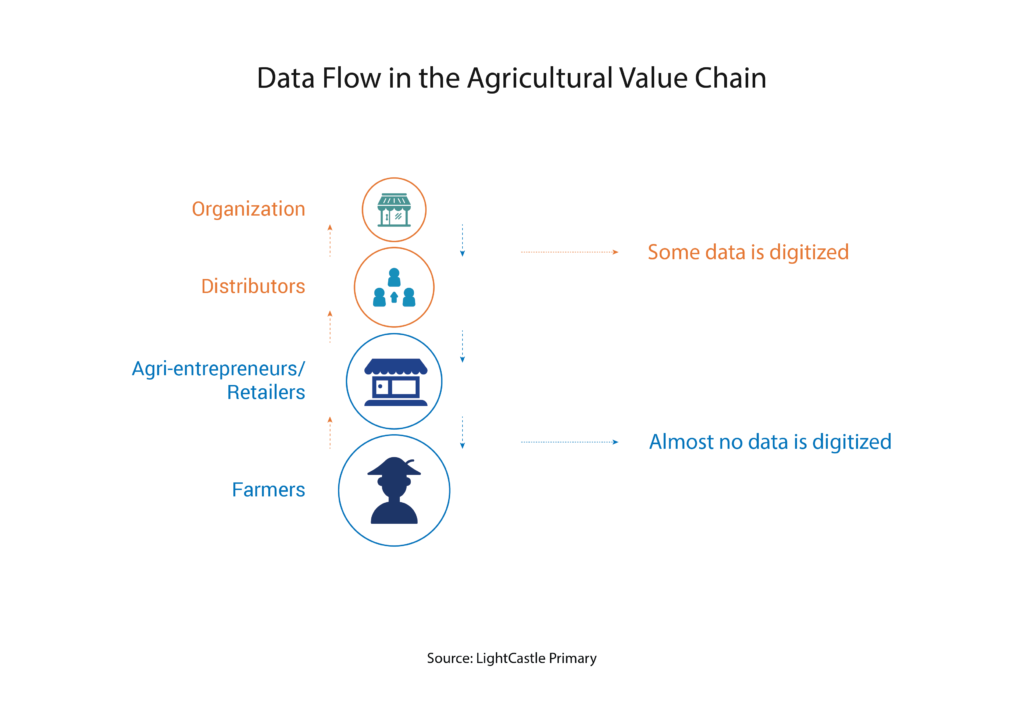GET IN TOUCH
- Please wait...

Consider Abdullah, an agri-entrepreneur in Northwestern Bangladesh. He wakes up in the morning to find a notification in a dedicated mobile application on his cellphone from his aggregator asking if he could supply 50 kgs of tomato from under his networked famers by next week. Through the push of a few buttons, he pulls up the expected harvest collection for next week and just as swiftly, but not before a smile lights up his countenance, lets the aggregator know that it’s a done deal. That’s how fast a simple piece of information – yet carrying powerful ramifications for everyone in the agri-value chain – flows from one end of the spectrum all the way to the other, in a matter of seconds.
That’s what data and ag-tech are doing; they are changing the game. The integration is opening up wider avenues of business opportunities, rendering greater income potential and inspiring the next generation to resurrect the image of an industry that’s slowly taking a backseat, but which nonetheless has been the growth driver of Bangladesh in its early years. A paradigm shift in agriculture is already underway.
In a world where data talks, industries and organizations need to step up and leverage data and technology for the greater good. A vast amount of data we are currently sitting on – both individually and collectively – is, at best, serving the purpose of a sleeping giant. As a nation, we are yet to recognize the full potential that data can trigger to create larger impacts for organizations, across all spheres, transcending to social benefits and into economic development.
The case for data-driven agriculture is no different. Smallholder farmers along with other stakeholders in the agricultural value chain typically lack the necessary knowledge and foresight to apply data-driven decisions, which is absolutely critical to compete and succeed in an ever-changing business environment. This apparent problem is only a symptom of a larger problem that exists across the entire agricultural value chain. And that’s because data is not getting captured digitally – resulting in several inefficiencies.
Farmers need access to timely market information and agri inputs; agri entrepreneurs and distributors grapple with collecting cash on time and optimizing inventory; processing companies require robust customer and farmer profiling to ensure greater transparency to constantly improve the end consumer experience. So there’s a vested interest for everyone in the process.
Granted that data is a critical tool for development, what’s the first step towards building the culture? Digitizing paper-based information.
Rapid advancement in hardware and software technology is already paving the way for organizations to collect, analyze and leverage data for better business decisions than ever before. Many of them – either in the form of a rising group of ag-tech startups working towards improving crop productivity or large processing companies investing in data analytics and digital initiatives to predicting sales by region – are cases in points to demonstrate the growing importance of data digitalization. And those who will invest in building a robust data and analytics value chain will advance the furthest and fastest – increasing impact and income; those who are falling behind will risk becoming irrelevant.
What we can decipher from the above is that Bangladesh is moving towards the right direction. Having said that, at the risk of sounding pessimistic, we’re still lagging far behind. Broadly speaking, in the agri-value rung, data is currently getting digitized only between the processing companies and the large distributors. What happens from here onwards remains a mystery. Very little transactional data, if any, can be tracked from the distributor to the retailer to the micro-retailers to the farmers. The following exhibit sumps up the status quo.

Current practice entails a manual intensive process. Typically sales and purchase data is recorded on paper. But this practice is severely prone to error, cumbersome, and time consuming. Furthermore, it raises issues around reliability. Because of these reasons, companies at the top often lack the necessary insight to be able to correctly predict sales and duly optimize inventory.
Can you imagine if only companies had access to these information in digital format, how far could they have gone? Just by applying data analytics services, they would have been able to unearth several critical insights that are likely to open new doors to business models, highersales, cost & inventory optimization while simultaneously amplifying social impact.
By working with several large and small agricultural enterprises over the last few years, we have been able to garner some interesting insights that validate the above hypotheses. In doing so, we have developed and implemented a simple mobile based tool that sources data from multiple sources – including farmer profile & land information, transactional data at the point-of-sales, weather information and voice calls. By digitizing manual data, we have started to see several positive implications occurring across the entire spectrum. Remember Abdullah’s example? That’s the sort of change we have been able to witness.
It is clear that data digitalization is the way forward. It solves several pain points. First, it removes the time lag from order placement to delivery. Second, it ensures faster buyback guarantees for farmers. Third, it empowers all stakeholders to be more timely and efficient. Most important, this digital solution paves way for a sustainable way to strengthen market linkage between smallholder farmers and consumers.
Agri-tech is an essential solution for socio-economic development. With increasing support and investment on the digital front across the country, Bangladesh’s agriculture is likely to witness more digital transformation. Early results underscore the conclusion that this can be a viable business agricultural service model, facilitating the creation of new business models, product innovation, and targeted campaigns. To this end, concerted efforts between the private and the public sector will play a crucial role. And in doing so, we will be able to empower market actors – including smallholders – to become more data-driven in their day-to-day decisions.
This has been published as part of LightCastle’s 6th year anniversary publication, “LightCastle Featured Insights 2019“.
Our experts can help you solve your unique challenges
Stay up-to-date with our Thought Leadership and Insights